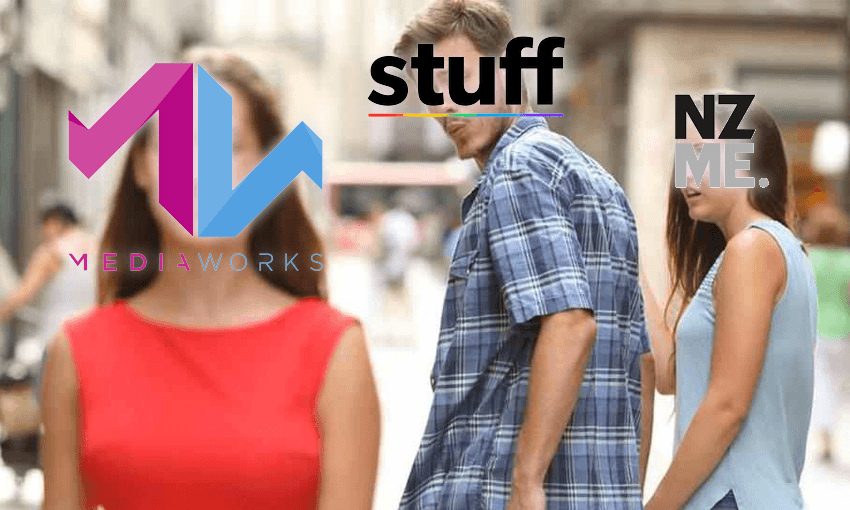Stuff-Me is dead, with the merger between media companies Stuff and NZME once again denied by the courts. A different combination now looms large as a possibility, but would it work?
At a certain point, you probably have to accept that they’ll never let you be together. That’s the harsh lesson for Stuff and NZME, who have now had their merger rejected by the Court of Appeal, the High Court, and the Commerce Commission. NZME says they’re going to continue to look at their options, but surely it’s all over now.
The reason given is the same as it has been the last few times – the potential loss of media diversity. Between them, a merged entity would have owned pretty much the entire newspaper market (barring a few small exceptions like the Otago Daily Times and Greymouth Star) about half the commercial radio market, and the two websites that utterly dominate the online market. It would have also owned a range of other products like Neighbourly, One Roof and Yudu, but that’s unlikely to have factored into the decision, which was made on the grounds that it would concentrate too much editorial power in one place.
The merger was floated in the first place because media companies are finding it more and more difficult to make ends meet, and the companies wanted the scale to compete in the advertising market with the likes of Google and Facebook. Even this country’s biggest players are but a blip compared to those global giants. And in the intervening time between the merger first being proposed and the latest rejection, none of those problems have got any better for Stuff or NZME. In fact, they’ve inarguably gotten worse.
Stuff is now basically a speck on the shoe of its owners. When owner Fairfax merged with Channel Nine in Australia, Stuff wasn’t even mentioned in the initial announcement. The Australians say Stuff is a “free agent” in New Zealand, and they’ve been forthright about wanting it to find a dance partner, and soon, as well as recently slashing the value of the assets. As for NZME, they’re currently working towards the introduction of a paywall for their premium journalism content, and recently reported their own EBIDTA results as merely “solid” – not exactly cause for panic, but a long way away from when classifieds gave newspapers a license to print money. A good recent radio survey result – one of the traditional breadwinners of the business – will give hope that there is room to move.
So under the fairly safe assumption that Stuff-Me is now off the table, what other options are out there for the two suitors? One in particular gets talked about with the most seriousness – a merger between Stuff and Mediaworks. That would see Stuff’s massive website and rapidly diminishing collection of newspapers combined with the TV channel Three, a network of very successful music radio stations and a not particularly successful talk radio station, and the overall Newshub TV and online brand.
One thing that people get fixated on when it comes to media mergers is news. And the reasons why are obvious – the sorts of people who talk about media mergers are probably also interested in news, and believe that news is important for society, and so on. But strictly speaking, news is generally a subset of the operations of media companies, and an expensive one at that. Media companies are in the business of content. And between the two of them, the content operations of Stuff and Mediaworks would be mutually very attractive.
Mediaworks have been incredibly effective at wringing more content out of their personalities, whether they are radio hosts and TV presenters, reality TV contestants, and even their journalists. Newshub tends to get a lot of value out of people like Lloyd Burr, Tova O’Brien and Patrick Gower. Shows like The Block and Dancing with the Stars are often ratings behemoths, and they’ve got a huge stable of talent to call on for shows like Jono and Ben, The Project, and 7 Days. Being multi-platform, they can create a media ecosystem that holds the attention of audiences throughout the day. The absurd ‘Newshub Challenge‘ aside, a lot of New Zealanders actually do just that. Imagine the impact that having ready access to the largest click-for-click website in the country would have on the commercial value of their entertainment content.
Would news diversity be affected by that too though? Such a merged entity would instantly become the most powerful news organisation in the country (provided there weren’t large scale layoffs) but it wouldn’t have a monopoly in any particular medium. Newshub at 6 and The Project still tend to rate considerably collectively lower than 1 News and Seven Sharp, (though The Project wins a few nights each week) RadioLive lags heavily behind Newstalk ZB, and while Stuff is the country’s biggest website, the NZ Herald, TVNZ, and Radio NZ would still be competitive (along with plucky upstarts like your old mates at The Spinoff.)
Regardless though, cuts in the newsroom are almost certainly now coming across many, and perhaps all commercial media companies. It has already begun in the sports department at the NZ Herald, with staff being told they’ll need to reapply for a smaller number of jobs. Both Stuff and NZME have also recently been making quality hires, with the Herald picking up Chris Keall and Duncan Bridgeman from the NBR, while Stuff have hired aggressively from across the industry all year. But that’s almost certainly not sustainable if costs need to be cut. The two companies have been operating on the assumption that the merger won’t go ahead, and they’ll need to keep fighting the eternal war for eyeballs. Now that has been all but confirmed, new alliances will need to be forged.
The Bulletin is The Spinoff’s acclaimed, free daily curated digest of all the most important stories from around New Zealand delivered directly to your inbox each morning.

